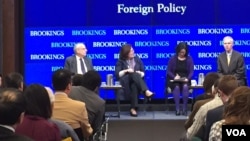Although the U.S. and other world powers have sharply criticized North Korea for conducting a fourth nuclear test and announcing plans to launch an “observation satellite,” there is wide disagreement over what steps should be taken to curb Pyongyang’s nuclear and ballistic missile ambitions.
The U.S. Congress moved to impose additional sanctions on North Korea after it said it had carried out a successful test of a hydrogen bomb, last month.
The House of Representatives passed a bill designed to make it more difficult for Pyongyang to get the hard currency that it needs for its nuclear weapons program. The Senate is considering a measure that would enhance U.S. penalties on North Korea.
But analysts say sanctions alone are no game-changer when it comes to efforts to curb what world powers view as North Korea’s provocative actions.
“I don’t think anyone in the United States government believes that the mere imposition of heightened sanctions will in some measure automatically get North Korea to alter its behavior,” said Jonathan Pollack, an East Asia policy analyst at a Wednesday forum at the Brookings Institution.
But he said the penalties could “raise the costs” to Pyongyang for the action that it has undertaken.
Satellite launch
North Korea may have further heightened U.S. concerns when it announced, on Tuesday, plans to launch an “earth observation satellite” between February 8 and 25.
The North Korean government says it has a sovereign right to pursue a space program but the U.S. and other world powers fear the launch would be an attempt by Pyongyang to covertly advance its long-range ballistic missile program, a move that would violate U.N. resolutions.
Daniel Russel, the Assistant Secretary of State for East Asian and Pacific Affairs, said the U.S. is closely following reports of North Korea’s planned launch, which he said would be an “egregious violation” of international obligations.
Analyst Katherine Moon said a new approach is needed to get North Korean leader Kim Jong Un’s attention.
“North Korea is trying new things, different things. I feel like we are the ones, outside of North Korea, that are responding with the same things,” said Moon, the South Korea-Korea Foundation chair at the Brookings Institution.
Moon said there has been little change in how the U.S. responds to North Korea because there is a lack of a clear policy about “what to do with North Korea.”
“Whatever we have been saying, it has not been working,” said Moon. “Yet, we won’t admit that it is not working and move on to something different."
China Could Be Key
As U.S. lawmakers consider new sanctions on North Korea, a similar effort is underway at the U.N., where the U.S. and other permanent members of the Security Council are pressing a seemingly reluctant China to endorse tough penalties against Pyongyang.
“The sense of silence from China on this issue is really quite extraordinary,” said Pollack.
China, North Korea’s economic lifeblood, has said it is committed to the denuclearization of the Korean Peninsula but believes the best way to achieve this is through consultations and negotiations.
“Sanctions are not an end in themselves,” said Chinese Foreign Minister Wang Yi, last week, during a news conference with Secretary of State John Kerry.
Wang warned that any new resolutions, against North Korea, should not “provoke new tension” that could destabilize the region.
China may continue to show reluctance in imposing any harsh penalties on North Korea, said Moon.
“Unless North Korea’s actions threaten Chinese territory its people’s health, political stability, my belief is China will not act,” she said.
In the end, the U.S. and other world powers may have few new options to consider as they weigh their response to the provocations.
“We are moving out of our comfort zone of currently existing efforts to deter action by the north,” said Sheila Smith, a regional analyst at the Council on Foreign Relations.
“Pretty soon, the alliances really do have to come to grips with the fact that they are going to have to deal with a very different Pyongyang if we allow it to go much further,” she said.




